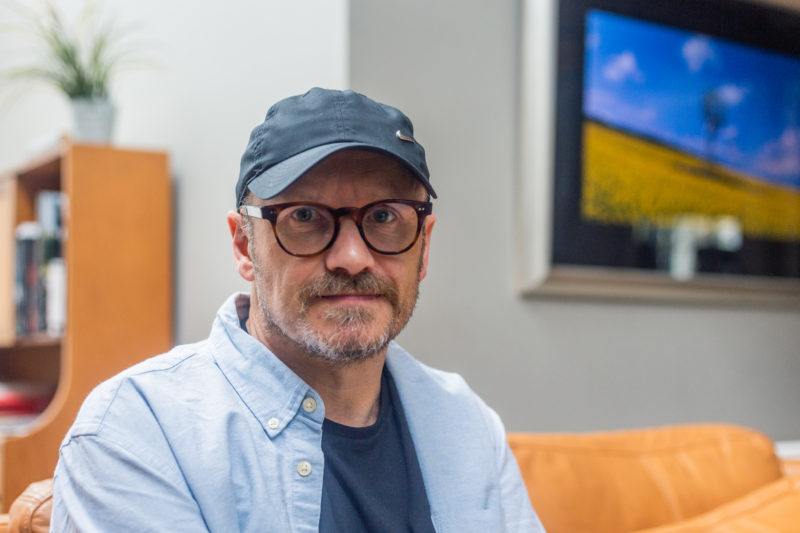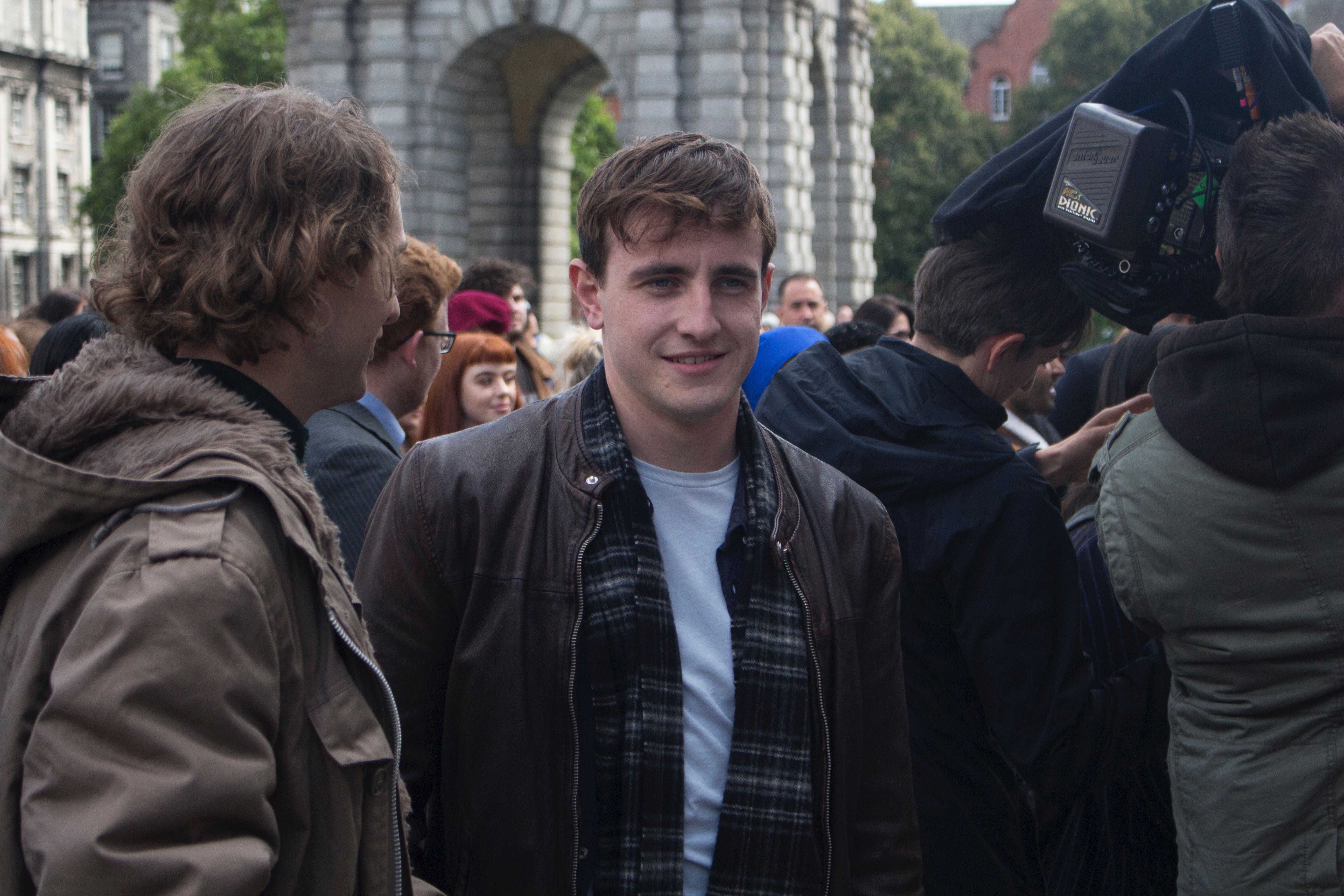
It’s a Wednesday afternoon and I have come to Outer Limits Post Production studio in Dún Laoghaire to interview Academy Award-nominated director Lenny Abrahamson. We’ve met before briefly, on the set of his current project, the BBC adaptation of Sally Rooney’s Normal People.
Naturally, I don’t expect Abrahamson to remember me – I was the least important person on a shoot with over 100 members of cast and crew. To my surprise, he strides into the room and exclaims: “Susie, nice to see you again!” Immediately, he offers me a coffee and then fumbles with a Nespresso machine, finally producing an Americano in a sugar bowl. When I ask for a drop of cold water in my coffee, Abrahamson says, “Yeah. I’m a lukewarm kind of guy”. No longer the powerful, serious director I had seen on set, Abrahamson is self-deprecating and unassuming off duty.
When I heard that Abrahamson, a Trinity graduate, would be directing the first six episodes of Normal People, I was surprised. In his own words, the director is more “drawn towards dark takes on the human condition”. Rooney’s tale of two young sweethearts seems too romantic for a man whose previous films include Adam and Paul (2004), an account of two heroin addicts finding a fix in Dublin, What Richard Did (2012), the story of the manslaughter of a teenage boy, and Room (2015), a narrative based on the imprisonment of a woman and her young son. I was intrigued to know why Abrahamson abandoned doom and gloom in favour of Normal People.
“I read it and I absolutely fell in love with it”, he says, simply. “It’s just so hard to walk away from something so great. I couldn’t not do it, basically, which is always the reason that you do something. It’s such an unusual look, and such a deep look, at people at that kind of crucial point in their lives.”
Abrahamson is particularly animated as he discusses Rooney’s depiction of love and sex: “It’s such an extraordinarily positive account of first love and of sexuality. I was too excited to say no.”
But Abrahamson is exceptionally careful with his words, and he grapples with his own use of the word “positive”. “Often, warm – in inverted commas, ‘positive’ – stories don’t convince me. No – let me start again. If you’re going to do justice to what it’s really like to be living in the world, so much of it is dark and difficult. Sally’s writing is so good, I felt that there was no simplistic element in her account of a good and deep love. It was very true to life with all its darkness.” Really concentrating on what he’s saying now, Abrahamson says that “it’s not that I don’t want to tell positive stories, it’s just that I have a kind of allergy to stories that are glibly positive or easily positive, [stories] that don’t take account of how hard it is to find happiness – of how rare it is to experience something as uplifting as the two characters experience in this book”.
Trinity is a very particular and beautiful environment, so it lives very vividly for me, and doesn’t feel that long ago
For Abrahamson, who’s known for his instinct-driven approach to casting, it was particularly important to have the right actors in the roles of Connell and Marianne. When it came to giving Paul Mescal and Daisy Edgar-Jones the principal roles in Normal People, Abrahamson didn’t deviate from the tried-and-trusted method. “It is a kind of gut feeling. As soon as I saw [Mescal], I thought: that’s so much the character I’ve imagined, it’s so brilliantly right.”
And if Abrahamson faced criticism for casting an English actress to play the part of Marianne, he stands by his decision. “Daisy just had this delicacy and vulnerability and at the same time a capacity to present in a spiky, difficult way, that was just so … it’s such a tricky part. It is hard to find the right actor for a role. You have to find the right actor, and nothing else matters.” He tells me that Mescal and Edgar-Jones are wonderfully, intellectually in tune with each other off-camera, making their on-screen relationship more convincing: “They love the jousting that they do with each other, and they’re brilliant collaborators for that reason.”

Abrahamson says Paul Mescal, who plays Connell in Normal People, is ‘brilliantly right’ for the role.
Much of Normal People is set in Trinity, and Abrahamson acknowledges the importance of a directorial opportunity that he says “reminded me of experiences that I’d had. It obviously had that connection to Trinity that I remember”. Filming on campus this summer brought back fond memories for the director: “It was such a formative time for me. It’s a time in your life when I think your brain is really fizzing.”
His recollection of his time in College is clear. “Trinity is a very particular and beautiful environment, so it lives very vividly for me, and doesn’t feel that long ago. All the impressions, all the sensory impressions, like autumn in Dublin, and people lighting fires, and the smells of it, and the leaves changing, and having conversations with people, and feeling like an adult for the first time. All of that is so massive. Wherever you are at that time in your life, I think, looms large in memory”.
After a false start studying theoretical physics, Abrahamson found his feet when he re-entered first year as a philosophy student. Like Rooney’s Connell and Marianne, and the author herself, Abrahamson became a Scholar at Trinity: “You probably weren’t even born actually – I got Schols in 1989.” I tell him I was born seven years after he was awarded Schols and he lets out a long groan. “Oh God. Maybe it was 1990.”
I’m really, really attached to Dublin. I’m attached to Ireland like a kid’s attached to home
He recalls hours spent in the library engaging with texts. “So much of formative intellectual development for me in philosophy, which I loved, was sitting on the top floor of the Berkeley. We put Paul [Mescal] in the seat that I used to sit in, and it was just so nice to film another person sitting there. That was a lovely completion of a circle for me, somehow.”
It’s this point that Abrahamson seems to lose all interest in himself. “Do you – it’s not your interview – but do you feel like there are things you wish you were more confident about? Or do you wish you could do more in college?” Laughing, I can’t respond properly, and Abrahamson remembers that he’s supposed to be talking about himself. He appears to lack the enormous ego that you’d expect from a world-famous director. He seems – I hate to use the phrase, but it’s the truth – down to earth.
I ask Abrahamson how he, an unfailingly well-mannered man, commands a film set. I can’t imagine him losing his patience with an unco-operative actor. “Sometimes [directing] is incredibly frustrating. I mean, it can be the most frustrating thing. I have that frustration and it does build up sometimes in me, but I’m good at not taking it out on other people. I just can’t stand that dynamic. I cannot stand bullies. I can’t stand it.” His method of dealing with this frustration is wonderfully Irish: “My way of working is, you just have to swallow that stuff.”
I remind the Academy Award-nominated film director that he’s at a point in his career where he can probably afford both Virgin Media and Sky
He swears only once during our hour-long conversation, to emphasise his distaste for bad manners. “I’ve worked with one or two actors that need conflict, and it’s a fucking pain in the arse.” For a minute he is the archetypal difficult actor, complete with whiny, childlike voice: “Well, why would I do that? Is that not just shit?” For the record, I’m convinced that Abrahamson exaggerates his South Dublin accent for comic effect during this brief performance.
But Abrahamson’s accent is distinctively Dublin even without comedic exaggeration. Raised in Rathfarnham, he says Dublin still has a hold over him. “I’m really, really attached to Dublin. I’m attached to Ireland like a kid’s attached to home. I used to get homesick as a kid and I have that feeling about Dublin. Now, I’ve lived in other places and I’ve worked in other places and I really like it, but I always feel like I can breathe out fully when I’m back in Dublin.” He tells me that he plans to shoot more in Ireland in the coming years.
I’m curious about what else Abrahamson plans to do in the future, and I’m stunned when he tells me he’d “love to do a musical”. He adds quickly that it’d be “a very left-field musical”, but I have to ask if any genre is off-limits. “I would not do a rom-com. I just wouldn’t be good at it. Someone would die in the end of my rom-com, you know? It wouldn’t end well.”
Though the director has no desire to work on the vapid, low-culture projects that so many of us love, he does have his own guilty pleasures. “I’ll tell you what I am fascinated by-90 Day Fiance. Have you seen it? I don’t have Sky, I’ve got, like, Virgin, so I can’t actually watch it unless I’m over at my mum’s or my sister’s. There’s one guy, I’m dying to know what happens to him but I don’t have – I might have to get Sky to find out what happens to him.” I remind the Academy Award-nominated film director that he’s at a point in his career where he can probably afford both Virgin Media and Sky. “Oh my god. That never occurred to me, but do you know what? You’re actually right.”
The future is bright for Abrahamson. His adaptation of Normal People will air early next year on BBC Three, he’s already in talks for his “left-field” musical, and, I hope, he will soon invest in Sky TV and finally gain the closure he deserves on 90 Day Fiance.






